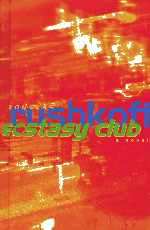
After five non-fiction books, cyberspace consultant Douglas Rushkoff turns his hand to fiction with mixed results. There is no faulting his technical ability, but, while Ecstasy Club is ostensibly science fiction, Rushkoff stays to the path that he has tread with his non-fiction, a path nearly worn into a rut by others.
The Ecstasy Club is a loose group of individuals who come together to renovate an abandoned piano factory and turn it into the next big thing on the rave circuit. The leader, George Duncan, an ex-patriot Brit, provides the focal point that the others orbit: Zach, our narrator, idealistic yet never totally lost in the clouds, unless he is high or in love; Lauren, Duncan’s girlfriend, into Bonsai, architecture, and other forms of graphic design; Pig, the hacker, able to write HTML code using Windows’ Notepad; Kirsten, erstwhile Deadhead, into theater and the absurd; Peter, who once did drug feedback experiments until the accident that put his co-researcher into a coma; and Henry, who snorts instead of shoots heroin when he decides to sober up. Of course, things go swimmingly at first–a great kick-off party that brings in a profit and great street cred–but then things start breaking down as the inevitable personal and sexual interplay between the Club members punctures the lofty aspirations and The Real World (both the MTV show and true life) intrudes. The plot is like a drug fix (to use an analogy that the book would be comfortable with): it is a lot of fun at first, but as the initial high wears off, everything starts looking sordid.
If the novel did not try to be so hip and so on scene, its shortcomings would not be so glaring. The thinly veiled organizations and characters taken from today’s headlines serve as annoying in-jokes rather than praiseworthy satire. And, frankly, without its references to ’90s culture and counter-culture, Ecstasy Club reads like a poor man’s Illuminatus! Trilogy. Robert Anton Wilson and Robert Shea mixed drugs, paranoia, freemasonry, sex, and pop culture better than this twenty years ago, and their story was funny to boot.
[Finished 1997; originally published on SF Site]
